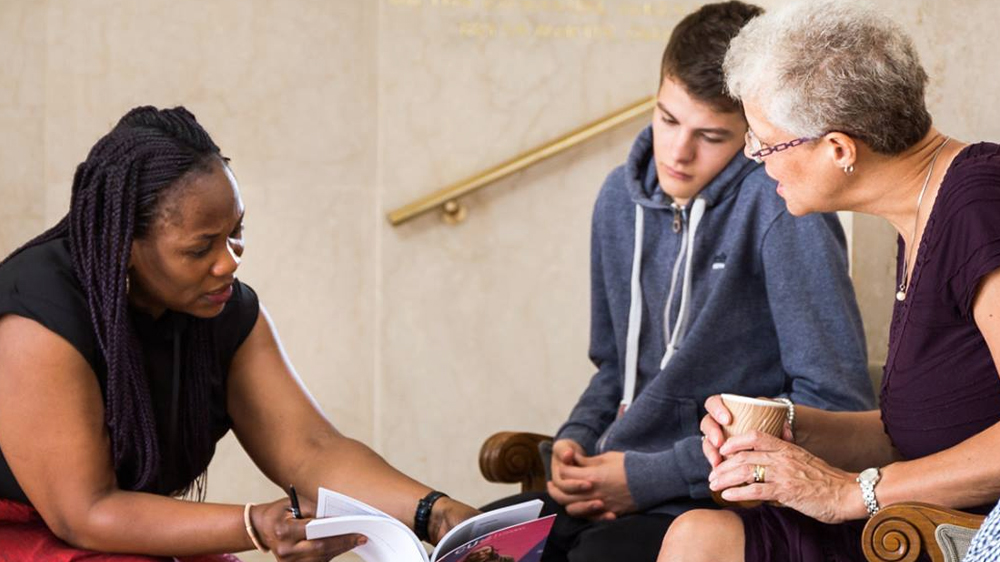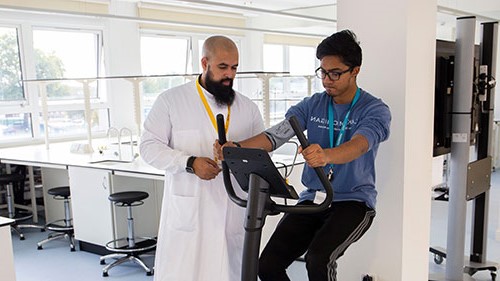Search
Health and Social Care BA (Hons) with foundation year
Study level: UndergraduateHNC/HND courses

This Health and Social Care BA (Hons) course explores the core concepts of healthcare through theoretical and practical learning.
Course option
Year of entry
Location
CU London (Dagenham, London)
Study mode
Full-time
Sandwich
Duration
4 years full-time
5 years sandwich
UCAS codes
L509
Start date
September 2025
November 2025
January 2026
March 2026
May 2026
June 2026
Course overview
Our degree with foundation year could be the stepping stone you need to achieve your goals. The foundation year aims to prepare you for degree-level study and is a great way to build the confidence, skills and knowledge needed to succeed on your degree course.
Foundation year
The foundation year aims to provide you with a solid grounding for building a career in health and social care-related disciplines.
Degree
This course aims to help you become a knowledgeable, enthusiastic and skilled individual ready to support the delivery of health and social care within the NHS, local authority services, private health provision or third-sector services. It provides the opportunity for the development of the knowledge and skills required of healthcare support workers, community healthcare workers and those with roles in health and social care, and can offer a Continuing Professional Development opportunity for those in the sector.
Why you should study this course
The course is designed to:
- analyse the interaction between sociology, social policy and health
- prepare you to work in this dynamic and demanding sector by exploring health on an individual and societal level
- explore how society is organised and how we care for the vulnerable, the challenges facing modern society and the importance of caring for our environment.
What you'll study
We regularly review our course content to make it relevant and current for the benefit of our students. For these reasons, course modules may be updated.
How you'll learn
Entry requirements
Typical entry requirements:
Fees and funding
Foundation year
| Student | Full-time | Part-time |
|---|---|---|
| UK, Ireland*, Channel Islands or Isle of Man | £9,535 | Not available |
| International/EU | Not currently available*** | Not available |
Degree
| Student | Full-time | Part-time |
|---|---|---|
| UK, Ireland*, Channel Islands or Isle of Man | £9,535 per year | Not available |
| International/EU | Not currently available*** | Not available |
If you choose to study this course with a professional placement2 or study abroad year, you will need to pay a tuition fee3 to cover your academic support throughout your placement year. Students commencing their professional placement in the academic year 2027/28 will pay £1,500 if they are paying UK fees, or £1,800 if they are paying international fees.
For advice and guidance on tuition fees and student loans visit our undergraduate finance page and see the university’s Tuition Fee and Refund Terms and Conditions.
The University will charge the tuition fees that are stated in the above table for the first Academic Year of study. The University will review tuition fees each year. For UK (home) students, if Parliament permits an increase in tuition fees, the university may increase fees for each subsequent year of study in line with any such changes. Note that any increase is expected to be in line with inflation.
If you choose to study this course with a professional placement, the University will charge the tuition fees stated above for those on a placement during Academic Year 2027/28. The University will review professional placement tuition fees each year. For UK (home) students, the University may increase fees for each subsequent year of study, but such that it will be no more than 5% above inflation.
For international students, we may increase fees each year, but such increases will be no more than 5% above inflation. If you defer your course start date or have to extend your studies beyond the normal duration of the course (e.g. to repeat a year or resit examinations) the University reserves the right to charge you fees at a higher rate and/or in accordance with any legislative changes during the additional period of study.
We offer a range of International scholarships to students all over the world. For more information, visit our International Scholarships page.
Tuition fees cover the cost of your teaching, assessments, facilities and support services. There may be additional costs not covered by this fee such as accommodation and living costs, recommended reading books, stationery, printing and re-assessments should you need them. Find out what's included in your tuition costs.
Applies to degree only:
The following are additional costs not included in the tuition fees:
- Any optional overseas field trips or visits: £400+ per trip.
- Any costs associated with securing, attending or completing a placement (whether in the UK or abroad).
Foundation year funding
In order to receive funding for degree with foundation year courses, you will need to complete a four-year degree programme which includes the integrated foundation year, otherwise you may be responsible for your foundation year fees. For further information, please refer to the 'Tuition Fee Loan' details in the 'Funding your undergraduate course' section of our 'Fees and finance' page.
*Irish student fees
The rights of Irish residents to study in the UK are preserved under the Common Travel Area arrangement. If you are an Irish student and meet the residency criteria, you can study in England, pay the same level of tuition fees as English students and utilise the Tuition Fee Loan.
**This course with foundation year is not currently available to international students. If you do not meet the entry requirements to directly join year 1 of the degree, please take a look at our International Pathway courses for additional options.
Facilities
You’ll be based in the spacious Civic Centre building, which provides an outstanding learning environment.
You will have access to our Library & Learning Services, which hosts multiple study areas and loanable laptops, fully equipped seminar rooms and impressive IT suites.
Facilities are subject to availability. Access to some facilities (including some teaching and learning spaces) may vary from those advertised and/or may have reduced availability or restrictions where the university is following public authority guidance, decisions or orders.
Careers and opportunities
On successful completion of the course, you will have the knowledge and skills to be able to succeed in the health and social care sector. You will develop communication skills and the ability to work as part of a team. Through teaching and assessment, you will have developed a range of digital skills that are required for work and be able to demonstrate a range of competencies.
On successful completion you could explore roles in a variety of health and social care settings, such as working with those experiencing mental health issues or domestic violence, tackling environmental health issues or in public health teams. You may wish to continue to further your studies at postgraduate level in areas such as nursing, social work or postgraduate teacher training.
How to apply
This course with foundation year is not available to international students.









